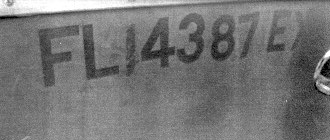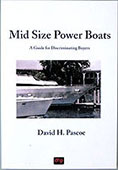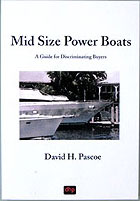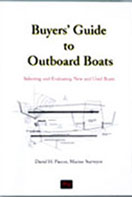How To Avoid
Purchasing A Stolen Boat
by David Pascoe
The thought of unwittingly purchasing a stolen boat does not occur to most boat buyers. When it happens it doesn't make the morning paper or the evening TV news. Yet the number of small boats that are stolen each year has been steadily increasing for several decades, to the point where it involves several hundred thousand boats annually across the nation. The odds of running across one of these has become uncomfortably high.
The risk of the stolen boat being discovered is also increasing. All over the nation, the legions of bounty hunters roaming the docks and marinas are also increasing. Thus, the chance of someone who unwittingly purchases one of these boats of loosing it is fairly high.
In the state of Florida alone, which has about one million registered boats, based on insurance records, I estimate that up to 5,000 boats are reported as stolen annually. Some are stripped and destroyed, others are shipped out to foreign countries, but the vast majority of stolen boats end up being altered in various ways and resold in other areas or states.
Stolen boat cases are often involved in insurance fraud. Unscrupulous owners who get in financial trouble rather frequently will sell the boat for whatever he can get for it and, at the same time, report it stolen and try to collect the insurance. Its a quick way to make a lot of money if they can get away with it. This scam has become so widespread that both insurance companies and state agencies are very much on the alert. Many state agencies have stepped up their review procedures of title and registration changes so that more and more of these frauds are being discovered. The problem for the boat buyer here is that this greatly increases the chance of his unwitting purchase of a stolen boat being discovered. When that happens, he may find himself involved in costly litigation.
Most people who purchase a stolen boat are never aware of the fact that they own one unless its discovered by a state title agency, or the small army of bounty hunters commissioned by insurance companies that are searching for them. The bad news is that even though one may have no knowledge of having purchased a stolen boat, when it is discovered the new owner has to forfeit the boat, usually with no recourse for recovery of his loss. Even worse, he may even find himself trying to fend off criminal charges of conspiracy or being in possession of stolen property.
As many as a half-dozen times per year I run across boats that have anomalies in either the hull or registration numbers. In fact, most stolen boats that are resold have only a minor change in the H.I.N. or Hull Identification Number. Because these numbers are only molded into the plastic of the hull, it is a very simply matter to alter it. Hull numbers can be completely changed, or it may only have one or a few digits altered. Either way, its a process that a thief can accomplish in less than an hour.



One of the above hull numbers was fraudulently altered. Can you tell which one? The center number was altered by the builder. It is legitimate despite the ragged appearance of the impression. bottom number is unaltered. The number at top is not a bad picture, but a number on a stolen boat. The tip-off is the indistinctness of the numbers that showed obvious signs of alteration.
But what about other identification numbers such as engine serial numbers, you may ask? How do thieves alter these numbers? Ah, there's the problem for the poor soul who purchases a stolen boat. It is a very rare instance when insurance surveyors or bounty hunters find boats on which the engine numbers have been changed or removed. That means that the engine numbers remain as a means of positively identifying a stolen boat. And if its discovered, the owner will surely loose it.
Fortunately, its a fairly simple matter to follow certain procedures to make sure that the boat you are contemplating purchasing is legitimately owned by the seller. Consider the following important points.
Be extremely wary of a hull number that appears to be obscured in any way. When older boats have been repainted, often the numbers are painted over so that they're difficult or even impossible to read. On the other hand, this may have been an intentional act to make the number impossible to read. Most of my clients don't even think twice about missing or obscured numbers, and that can be a big mistake. Regard any hull number that is not perfectly clear with great suspicion. If a number is completely or even partially obscured, do not accept the explanation that this happened during repainting. Assume the worst until proven otherwise.
Be wary of any hull number that shows any sign of having been altered. Hull numbers can be changed by grinding out the old and molding a new number in place with new gelcoat. Because gelcoat material fades and changes color with time, this operation may make the presence of new gelcoat rather obvious if one is looking closely. There should be no ripples or waviness around the numbers. Be suspicious if the molding surface is not smooth and the numbers very clear and distinct.
Check closely for signs that any number has been altered. Examples are turning a 1 into a seven, a 5 into an 8, and so on. Alterations on smaller boats are sometimes laughably crude.
It happens rather frequently that builders change the numbers on their own boats. Many state laws allow a builder to change a number of a boat that has been in their own stock from one model year to another so long as it has not been sold. Frequently, these number changes look very suspicious. Often they're perfectly legitimate, but its foolhardy not to check. Call the builder and ask about it. They are usually very cooperative in this regard.
Many states have a provision in their titling law that allows for the reassignment of a hull and registration number. This is called the "homemade boat" provision which provides the opportunity for a great deal of mischief. Let's say, for example, that I acquired a 1976, 29' Seabird hull and completely rebuilt it with new deck, interior and engines, etc. I could apply for a new title under the homemade boat provision and be assigned an entirely new hull number and title. In Florida, the new number assigned would have an FLZ prefix that indicates a homemade boat. The problem here is that stolen boat artists can do the same thing with any stolen boat. Therefore, any boat with an FLZ prefix should be viewed with great caution.

The problem with this registration number is painfully obvious - its got one too many digits. But not really. The "1" between the L and 4 is not a stick-on number but the residue from a number that was removed. Here, the adhesive was blackened with crushed pencil lead to make the missing number show up. The original number was 1438 but had been altered to 4387.
Another tip off may come from evidence that stick-on lettering for state registration numbers have been changed. Sometimes the hull finish will have faded and the old numbers can be seen. In other cases, the remaining gum residue of the old letters may be apparent, or can be shown up by rubbing a little dirt over them. The dirt will stick to the nearly invisible adhesive and be shown up more clearly. Because a number is supposed to remain for the life of the boat, unless its been moved from another state, there is not likely any good reason for the change. I have discovered several boats this way.
More stolen boats are discovered through inconsistencies in the paper work than any other means. Federal law requires that when state registration numbers are assigned, that number remains with the boat unless its reregistered in another state. And herein lies yet another means for thieves to try to legitimize a stolen boat. Transference of registrations and titles from one state to another provide a much easier means for the thief to provide false proof of ownership. The reason being that its harder, if not impossible, for the state bureaucracy to make a thorough check of another state's records. And bureaucrats, being what they are, usually won't make that effort. Buyers should be extra cautious when looking at an out-of-state boat in their home state.
Also be wary when "things just don't seem right." I know that's a rather vague statement, but here are some examples. The owner is a person who never appears and is always represented by a "friend". Used boats normally have a lot of the owner's cast-offs on board. Beware of a boat that is totally devoid of the little things like useless junk in drawers and so on. The boat appears to be economically beyond the means of the seller. While its not nice to stereotype people, sometimes there's just cause for suspicion. If the boat and the owner somehow just don't see to "fit," don't ignore the disparity.
A boat buyer can perform his own investigation by following this procedure:
- Immediately be suspicious of any hull number that shows the slightest sign of not being exactly right.
- Obtain from the owner as much paper work as possible. Find out how long he has owned the boat and get copies of all prior registrations. Examine all official documents for any sign that they have been altered. You would be amazed at how many thieves simply alter numbers on titles and registrations.
- Be wary of any seller who has owned the boat for less than a year.
- Be wary of freshly painted or refurbished boats.
- Owners that can't provide any records such as repair invoices and so on should be cause for suspicion. Most boat owners keep good records and there's no reason why they should not at least let you see them.
- Contact the state titling agency and verify the hull and registration number against the seller's name and address. Be wary of any inconsistencies. This can be done by phone in most states.
- Ask to see the title and registration before signing a purchase agreement or giving a deposit. If there is more than one owner, such as a husband and wife, ask to speak to the other party. Don't get caught in a divorce situation where one party completes the sale by means of theft from the other.
- For federally documented vessels, use a professional documentation service and make sure that they obtain and provide you with a copy of the document abstract. Do not complete the purchase until you have thoroughly reviewed this document. Make sure that all liens have been settled.
- Approach any boat with great caution that is being sold by a dealer which does not have it's own registration numbers, but instead has dealer numbers on it that the dealer will remove. The odds are high that there is a problem.
- Watch out for boats that have been recently brought to your state from another.
- Examine all official documents carefully for evidence of alteration. Accept only originals and not photocopies.
- Don't purchase a vessel that came from a non-titling state such as Alabama. The odds are extremely high that the boat is not legitimate.
- Examine the hull sides on the bow for evidence that registration numbers have been removed or altered. Frequently changes will be visible by gum residue or the outline of numbers against faded gelcoat or paint.
- Another means of checking are the variety of registration
stickers provided by many states. These stickers usually have
a decal number that can be followed up on with the state.
Crooks frequently overlook this subtle point. The decal numbers
must match the registration.
Marine Investigations: Chapter 10 - Fraud Investigations

















David Pascoe is a second generation marine surveyor in his family who began his surveying career at age 16 as an apprentice in 1965 as the era of wooden boats was drawing to a close.
Certified by the National Association of Marine Surveyors in 1972, he has conducted over 5,000 pre purchase surveys in addition to having conducted hundreds of boating accident investigations, including fires, sinkings, hull failures and machinery failure analysis.
Over forty years of knowledge and experience are brought to bear in following books. David Pascoe is the author of:
In addition to readers in the United States, boaters and boat industry professionals worldwide from nearly 80 countries have purchased David Pascoe's books, since introduction of his first book in 2001.
In 2012, David Pascoe has retired from marine surveying business at age 65.
On November 23rd, 2018, David Pascoe has passed away at age 71.
Biography - Long version